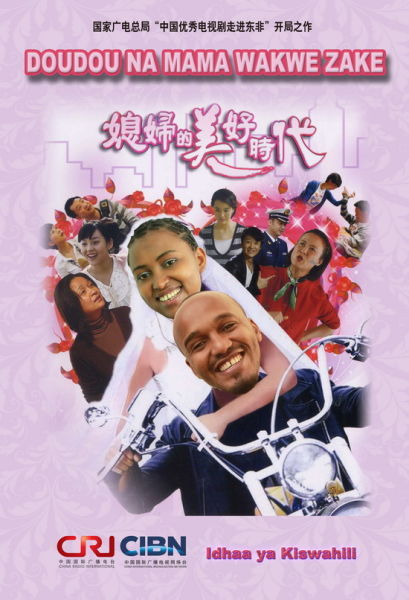揭秘:非洲人缘何喜欢中国媳妇?(双语)
 非洲版《媳妇的美好时代》
非洲版《媳妇的美好时代》3月25日,习近平主席在坦桑尼亚首都达累斯萨拉姆的尼雷尔国际会议中心演讲时特别提到:“中国电视剧《媳妇的美好时代》在坦桑尼亚热播,使坦桑尼亚观众了解到中国老百姓家庭生活的酸甜苦辣。”的确,由中国国际广播电台译配和制作的斯瓦希里语版的《媳妇的美好时代》在非洲热播,无疑为中非人民之间增进了解,传承友谊发挥了不可估量的作用。
斯语译配 拉近距离
由王丽萍编剧、刘江导演、海清和黄海波主演的《媳妇的美好时代》,通过描写两个中国普通家庭家长[微博]里短的故事,探讨了当代都市家庭的婆媳关系,以及拥有新观念的80后的婚恋观。2010年该剧在国内播出后,屡获大奖,广受好评,并被翻译成斯瓦希里语,在坦桑尼亚、肯尼亚、乌干达、科摩罗等国播出,反响强烈。
这部中国电视剧何以同非洲结缘?
中国国际广播电台斯瓦希里语专家、《媳妇的美好时代》配音总监陈莲英在谈到选择这部电视剧的初衷时说:“应该感谢中国驻坦桑尼亚大使馆的刘东参赞,他在同坦桑尼亚国家广播公司商洽工作的时候,了解到坦桑尼亚非常希望引进中国的电视剧。”东部非洲国家有1亿讲斯瓦希里语的居民,这让刘东萌发了将中国电视剧用斯瓦希里语配音播出的念头。而在此前,当地观众虽然看过一些中国电视节目,由于语言的障碍,并未形成大影响,因而刘东坚定地要求用斯瓦希里语配音而不是采用以往打字幕的形式。当然,最终选择《媳妇的美好时代》,除因其较高的艺术水准之外,与该剧真实地反映了当代中国普通百姓的生活也不无关系。
2011年3月,中国国际广播电台斯瓦希里语部正式开始翻译剧本,8月10日开始配音。在中国国家广电总局和版权单位的积极促成下,两名肯尼亚最具号召力的演员也来到中国参与配音制作。历时46天,《媳妇的美好时代》斯瓦希里语版终于完成。同年11月23日在坦桑尼亚国家电视台举行了大型开播仪式。
百姓故事 引发共鸣
《媳妇的美好时代》斯瓦希里语版在坦桑尼亚开播后,立即引发了一股“中国媳妇”热。开播不久,译制组最快得到的消息就是7位外国专家的家人和朋友给他们打来电话,说已经看到了他们配音的电视剧,觉得“特好”。“没想到中国人的生活跟我们坦桑人的生活那么像。那样的媳妇、那样的婆婆,在我们坦桑尼亚也有。”
坦桑尼亚国家电视台副台长乔·卢加拉巴姆表示,看完《媳妇的美好时代》,“很多观众的第一反应是:原来现在中国人的生活状态是这样的。虽然坦中两国有文化上的差异,但婆媳之间、家庭之间的关系和矛盾有很大的共性,因此《媳妇的美好时代》引起了坦桑尼亚观众的强烈共鸣。”为剧中女主角父亲配音的肯尼亚男演员方迪·班戈说,这部电视剧之所以吸引了许多非洲观众,是因为两地的家庭结构及家庭琐事有许多相似之点。“坦白地说,中国文化和非洲文化或多或少有些相同”。在坦桑尼亚,有更多的大家庭,子女和父母甚至和亲戚都住在一起。正如坦桑尼亚观众所说,他们那儿有恶婆婆,也有善婆婆;有厉害的媳妇,也有孝顺的媳妇。总的说来,非洲人很喜欢像毛豆豆这样贤惠美丽的姑娘。肯尼亚女演员爱莎·吉特姆认为:“我在为这部电视剧配音时,感到剧中的情景同我在许多非洲家庭中看到的情况很相似。我已经结婚,但我的家庭没有出现剧中反映的婆媳矛盾,对此我心存感激。”
荧屏如窗 感知中国
在非洲,家庭是最重要的社会单元,同时也反映出各地的风俗习惯。传统的非洲家庭,男人总被认为是家里的核心,而女人则要依附于她的丈夫,所以家里很多决定都是由男人作出的。但是在今天,越来越多的非洲女性开始寻求独立,在家庭中扮演的角色更加积极。因此,也在某种程度上激发了婆媳之间的矛盾。通过这部电视剧,非洲观众可以了解到中国家庭的现状,比较中非之间家庭关系的共性和差异。
乔·卢加拉巴姆副台长表示,婚姻与家庭这个共同主题,使坦桑尼亚观众跨越了文化鸿沟,体验到了人类对美好生活的共同追求,《媳妇的美好时代》打开了坦桑尼亚人民了解中国的一扇窗户。
坦桑尼亚人口超过4000万,人们对快速发展的中国经济非常好奇,也很想知道中国是怎样进行建设的,非常想学习中国的经验。包括坦桑尼亚在内的非洲很多国家希望引进一些如何发展经济、如何创业的中国影视节目。相信在未来,通过这种跨文化传播,中国和非洲国家之间会有更多机会了解对方,就像《媳妇的美好时代》中的人物一样,经历过磨合之后,日子越过越红火。
Chinese TV series well-received in Tanzania
President Xi Jinping especially pointed out in his speech at the Julius Nyerere International Convention Center in Dar-es-Salaam, Tanzania on March 25, how popular Chinese TV series "The Beautiful Daughter-in-Law Era" had made the Tanzania audience aware of the lives of Chinese modern couples。
The well-known Chinese TV series was first aired in Shanghai in November of 2009. It was first dubbed in Swahili and broadcast across East African countries in 2011. Kenyan actress Josephine Moeni Waweru and actor Khamis Juma Swaleh were chosen to take on the voice dubbing for the leading roles in the African version of the series. It plays a vital role between China and African countries in understanding each other’s cultures。
Revolving around urban families, the 36-episode light comedy focuses on marital issues and the new attitude adopted by the post-1980 generation. The show tells the story of three women, who encounter various predicaments before tying the knot. Their relationships with their mothers-in-law aren't smooth and their attempts to please the parents spark hilarious and sometimes bitter confrontations, which reflect the prevalent marital problems in today's society。
Wang Liping, screenwriter of the TV series, said she had her doubts as to whether African audiences would be able to connect with the show. To her great relief, however, it has proven a success in Africa. "The overseas market is eager to know young Chinese people's state of mind in modern times," Wang said。
Liu Dong, cultural counselor of the Chinese embassy in Tanzania, said the series was a huge success. "Now in Tanzania, Doudou, the name of the lead character, has become a synonym for Chinese daughters-in-law. Whenever Chinese girls are mentioned in a conversation, local people refer to them as 'doudou.' We have received very positive feedback from the local audience." Liu Dong said the show reflects the real lives of contemporary Chinese people and truly resonates with local audiences。
Joe Lugalabamu, vice director of Tanzania State TV, said that the Tanzanian audience have been able to understand the series due to the emotional entanglements and personal relationships depicted in the show, as they resonate with African people as deeply as they do with the Chinese。
Kenyan Janet Nzomo said the tension between the show's mother-in-law and the daughter-in-law also exists in Kenya。
In Africa, the husband plays a vital role in traditional family life and the wife should abide by his way of living – for life. However, in many modern Tanzanian households, wives and husbands are challenging and questioning one another's constantly shifting roles. Women begin to seek independence and therefore the conflicts between mothers-in-law and daughters-in-law will upgrade as well. People may be able to find ways to solve their personal problems by watching the series。
(英文部分来源:China.org.cn)
- 安吉丽娜非洲探难民:指上钻戒变金戒(双语)2013-03-28 11:59
- 电视剧《媳妇的美好时代》红遍非洲(双语)2013-03-28 11:58
- 非洲掀起“女性美白风” 不惜用药物漂白2013-02-27 15:14
- 非洲小国斯威士兰禁穿超短裙 称引诱性犯罪2012-12-30 09:38
- 非洲的新宽带2012-05-07 18:44
